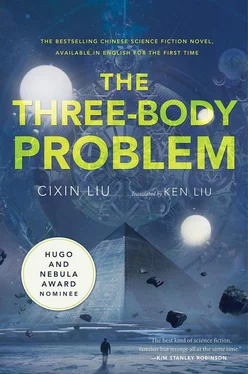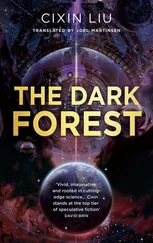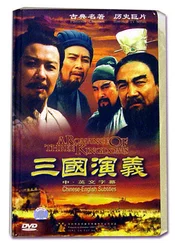Chaotic Era, Chaotic Era, Chaotic Era…
The thought turned and turned in Wang’s head. Why would the path of the sun through the world of Three Body be devoid of regularity and pattern? Whether a planet’s orbit is more circular or more elliptical, its motion around its sun must be periodic. Total irregularity in planetary motion is impossible….
Wang grew angry with himself. He shook his head, trying to chase away these thoughts. It’s only a game!
But I lost.
Chaotic Era, Chaotic Era, Chaotic Era…
Damn it! Stop! Why am I thinking about this? Why?
Soon, Wang found the answer. He had not played any computer games for years, and the hardware for gaming had clearly advanced greatly in the interim. The virtual reality and multisensory feedback were all effects he had not experienced as a young student. But Wang also knew that the sense of realism in Three Body wasn’t due to the interface technology.
He remembered taking a class in information theory as a third-year student in college. The professor had put up two pictures: One was the famous Song Dynasty painting Along the River During the Qingming Festival, full of fine, rich details; the other was a photograph of the sky on a sunny day, the deep blue expanse broken only by a wisp of cloud that one couldn’t even be sure was there. The professor asked the class which picture contained more information. The answer was that the photograph’s information content—its entropy—exceeded the painting’s by one or two orders of magnitude.
Three Body was the same. Its enormous information content was hidden deep. Wang could feel it, but he could not articulate it. He suddenly understood that the makers of Three Body took the exact opposite of the approach taken by designers of other games. Normally, game designers tried to display as much information as possible to increase the sense of realism. But Three Body ’s designers worked to compress the information content to disguise a more complex reality, just like that seemingly empty photograph of the sky.
Wang let his mind wander back to the world of Three Body .
Flying stars! The key must be in the flying stars. One flying star, two flying stars, three flying stars… what did they mean?
As he had that thought, he found himself at his destination.
* * *
At the foot of the apartment building, Wang saw a graying, thin woman, about sixty years old. She wore glasses and was struggling to go up the stairs with a basket of groceries. He guessed that this was the woman he had come to see.
A quick greeting confirmed his guess. She was Yang Dong’s mother, Ye Wenjie. After hearing the purpose of Wang Miao’s visit, she was grateful and appreciative. Wang was familiar with old intellectuals like her: The long years had ground away all the hardness and fierceness in their personalities, until all that was left was a gentleness like that of water.
Wang carried the grocery basket up the stairs for her. When they got to her apartment, it turned out to be not as quiet as he had expected: Three children were playing, the oldest about five, and the youngest barely walking. Ye told Wang that they were all the neighbors’ kids.
“They like to play at my place. Today is Sunday, and their parents need to work overtime, so they left them to me…. Oh, Nan Nan, have you finished your picture? Oh, it looks great! Shall we give it a title? ‘Ducklings in the Sun’? Sounds good. Let Granny write it for you. Then I’ll put down the date: ‘June 9th, by Nan Nan.’ And what do you want to eat for lunch? Yang Yang, you want fried eggplant? Sure! Nan Nan, you want the snow peas like you had yesterday? No problem. How about you, Mi Mi? You want some meat-meat? Oh, no, your mom told me that you shouldn’t eat so much meat-meat, not easy to digest. How about some fishie instead? Look at this big fishie Granny bought….”
Wang observed Ye and the children, absorbed in their conversation. She must want grandkids. But even if Yang Dong were alive, would she have had children?
Ye took the groceries into the kitchen. When she reemerged, she said, “Xiao Wang, I’m going to soak the vegetables for a while.” She had slipped effortlessly into addressing him by an affectionate diminutive. “These days, they use so much pesticide that when I feed the children, I have to soak the vegetables for at least two hours— Why don’t you take a look in Dong Dong’s room first?”
Her suggestion, tagged on at the end as though it was the most natural thing in the world, made Wang anxious. Clearly, she had figured out the real purpose of his visit. She turned around and went back into the kitchen without giving Wang another glance, and so avoided seeing his embarrassment. Wang was grateful that she was so considerate of his feelings.
Wang walked past the three happily playing children and entered the room that Ye had indicated. He paused in front of the door, seized by a strange feeling. It was as if he had returned to his dream-filled youth. From the depths of his memory arose a tingling sadness, fragile and pure like morning dew, tinged with a rosy hue.
Gently, he pushed the door open. The faint fragrance that filled the room was unexpected, the smell of the forest. He seemed to have entered the hut of a ranger: The walls were covered by strips of bark; the three stools were unadorned tree stumps; the desk was made from three bigger tree stumps pushed together. And then there was the bed, apparently lined with ura sedge from Northeast China, which the locals stuffed into their shoes to stay warm in the cold climate. Everything was rough-hewn and seemingly careless, without signs of aesthetic design. Yang Dong’s job had earned her a high income, and she could have bought a home in some luxury development, but she chose to live here with her mother instead.
Wang walked up to the tree-stump desk. It was plainly furnished, and nothing on it betrayed a hint of femininity or scholarly interest. Maybe all such objects had been taken away, or maybe they had never been there. He noticed a black-and-white photograph in a wooden frame, a portrait of mother and daughter. In the picture, Yang Dong was just a little girl, and Ye Wenjie was crouching down so that they were the same height. A strong wind tangled the pair’s long hair together.
The background of the photograph was unusual: The sky seemed to be seen through a large net held up by thick steel supporting structures. Wang deduced that it was some kind of parabolic antenna, so large that its edges were beyond the frame of the photograph.
In the picture, little Yang Dong’s eyes gave off a fright that made Wang’s heart ache. She seemed terrified by the world outside the picture.
Next, Wang noticed a thick notebook at the corner of the desk. He was baffled by the material the notebook was made of until he saw a line of childish writing scrawled across the cover: Yang Dong’s Birch-bark Notebook . “Birch” was written in pinyin letters instead of using the character for it. The years had turned the silvery bark into a dull yellow. He reached out to touch the notebook, hesitated, and retracted his hand.
“It’s okay,” Ye said from the door. “Those are pictures Dong Dong drew when she was little.”
Wang picked up the birch-bark notebook and gently flipped through it. Ye had dated each picture for her daughter, just like she had been doing for Nan Nan in the living room.
Wang saw that, based on the dates on the pictures, Yang Dong was three when she drew them. Normally, children of that age are able to draw humans and objects with clear shapes, but Yang Dong’s pictures remained only messes of random lines. They seemed to express a kind of passionate anger and desperation born out of a frustrated desire to express something—not the sort of feeling one would expect in a child that young.
Читать дальше












